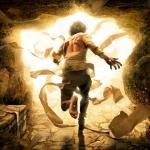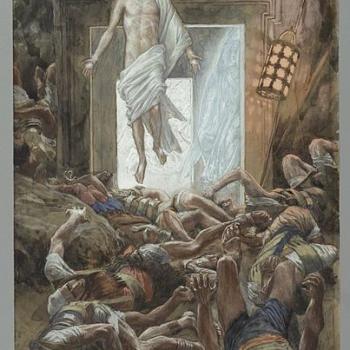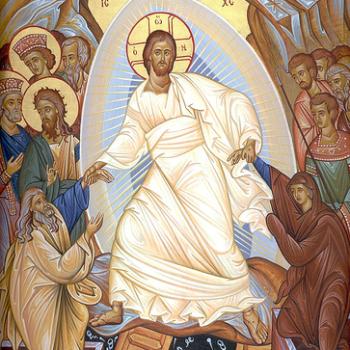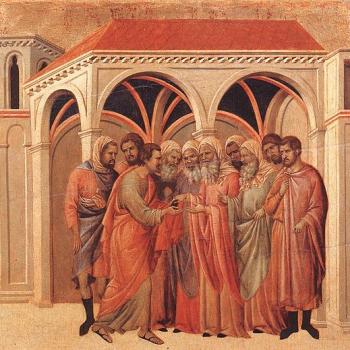I’m sure every other Christian blogger out there who is more eloquent than me has already written something or plans to write something about Easter and what it means to them or in general. I feel like I shouldn’t keep my mouth shut about it though, because it is very important. This weekend is happy and sad at the same time. The only way I can articulate it is that it’s like music that makes you happy and sad at the same time. Easter – Katie Curtis Music (wordpress.com) A Conversation With Singer Katie Curtis Shop for Easter Books
I feel the same exact way Katie does. So instead of demonstrating my own cleverness in coming up with original great displays of my writing ability in composing new thoughts about Easter, I thought I would share with you some that have already been written by the Broad Chorus of Catholic Thinkers. Look and Explore and Get Your Full Ticket’s Worth . There is a lot here for you to pick up and chew on in your brain. Maybe too much. But Easter Joy Springs and Multiplies like Bunnies. You’ll find things written by normal everyday Catholics and those Darn Liberals and Darn Rad Trads. And links to other things the quoted have said and found on the Catholic Bard.
So many words, so little time. –Mark Brumley The Society of Ignatius Press
And we did get to Jerusalem, several times! As Catholics, we found that was kind of comprehension overload — the realization that God walked right here, and according to tradition touched this particular stone, and died right here, is just disorienting. You only begin to appreciate it later, in pieces.
Tim Powers Three Days To Never: The Interview (September 08, 2006) jimmyakin.org The TBG of Catholic Speculative Fiction Writers
“We are an Easter People and Alleluia is our song!” St. John Paul II
Year after year, we pass through the penitential season called Lent, and on Easter we bring back our ‘Glorias’ and ‘Alleluias’, and we feast again. We might hear that we are “Easter people.” But what does that mean? Does anything change? Are we personally renewed? We have accompanied Jesus, in a spiritual sense, through his passion, death, and resurrection.
Bishop Robert Reed President of CatholicTV. How can we be ‘Easter people?’ – Catholic Digest NEW MEDIA WRITERS AND PRODUCERS
Steven D. Greydanus@DecentFilms: Why is the cross and not the resurrection the central Christian symbol?
Because while the resurrection is the foundation of our hope, the cross is our daily experience. Easter Sunday is what we look forward to. Good Friday is where we live.
(Steven Also Wrote This Article on the Catholic Bard Joe Biden is Not a Heretic )
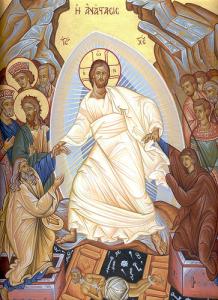
The Mystery of the Cross, A mystery essentially linked to the Resurrection. Just as Easter is meaningless without Calvary, Calvary is incomprehensible without the victory of the empty tomb.
Fr. Benedict Groeschel, Arise From Darkness 12 Catholics I Admire
Thus there emerges the Easter lesson that the power of evil and the chaos of any one moment can be defied and conquered, for the basis of our hope is not in any construct of human power, but in the Power of God Who has given to the evil of this earth its one mortal wound an open tomb, a gaping sepulchre, an empty grave. Easter by Archbishop Fulton J. Sheen (jehannedarc.org)
21 Catholic Voices
Without Easter, Good Friday would have no meaning. Without Easter, there would be no hope that suffering and abandonment might be tolerable. But with Easter, a way out becomes visible for human sorrows, an absolute future: more than a hope, a divine expectation. Hans Urs von Balthasar
Jesus said “He who sees me sees the Father”. Well… according to the Gospels to “see” Jesus is to look at the cross. Not exclusively (since Resurrection is part of this event too), but focally, centrally. It is to view the Resurrection in and through the crucifixion, which is why the Resurrected Christ is forever the “Lamb who was slain” and whose resurrected body still bears the marks of his grotesque torture.- Larry Chapp, Why Jesus Changes Everything: An Easter Meditation
But Easter without Good Friday is a non sequitur. A God who did not suffer torments and endure a cruel execution has not conquered sin and death and has no reason to emerge, victorious, from the tomb. So we, too, cannot expect the glorious resurrection of our own bodies and our entry into eternal beatitude if we do not first embrace the painful wood of the cross.
Steve Skojec- Good Friday Catholicism – OnePeterFive The Wisdom of Steve Skojec
Some object that the word “Easter” is of pagan origin; hence many non-Catholic Christians prefer the term “Resurrection Day.” Now, the etymological derivation of the word is uncertain, but some think it came from the Anglo-Saxon spring goddess, Eostre. If so, using the word to signify Christ’s Resurrection would represent another Christianization or “baptizing” of a human custom in order to supersede the old paganism and give the rituals an entirely new meaning in the light of Christ’s revelation. A word is not evil in and of itself. Even sacred words usually have secular origins.Is Catholicism Half-Pagan, & a Blend of Gospel & Lies? | Dave Armstrong (patheos.com) Biblical Evidence for Dave Armstrong
Eventually Easter approached and with it the great Vigil of Easter-that holy time at the end of the Holy Saturday, on the eve of the Resurrection, when the Church, from the beginning, has gathered most solemnly to bear witness to our passage (Passover) in Christ, out from Egypt of our bondage to sin, across the Red Sea of deliverance, into the Promised Land of salvation. It is at this time that the Church has, from the beginning, received catechumens by baptism into full participation in the mystery of the Church, and hence, into full communion with the Church at the Eucharistic Banquet. –Thomas Howard, Lead Kindly Light A Tribute to Thomas Howard
The Easter Vigil begins with the blessing of the Easter fire and the solemn carrying of the Paschal Candle into the dark church, which is slowly brightened as the light of Jesus Christ is passed from taper to taper. Listen to the chanting of the thrilling Exsultet and learn the joys that await us on this wonderful night. Hear salvation foretold and its history unfold in the prophecies of the Old Testament. Welcome the return of the bells and the Gloria and Alleluia, announcing the triumph of the risen Savior. Share the joy of those who will be baptized, confirmed, and given their first Holy Communion on this night; then, renew your own baptismal promises with a determination never to take the Faith for granted.
Holy Week: Get Your Full Ticket’s Worth – OnePeterFive
What Patheos and One Peter Five have in Common
A Taste of First Peter Five and Patheos Catholic
Fr. Casey, OFM@caseyofm: Am I the only one who spends the whole Octave of Easter feeling uncomfortable saying the word “Alleluia”? I mean, I just spent more than 40 days consciously avoiding the word for fear of embarrassment and ruining Lent, and now all of sudden have to use it in every sentence?
Jamming With The Angels on Catholic B.A.R.D.
Rich Andre, C. S. P.@richcsp:I’m grateful for Christmas-and-Easter Catholics. Our mission as Church is to be evangelizers. We have these two opportunities (in addition to baptisms, weddings, funerals, Ash Weds, Palm Sun) to easily reach out to people who are not fully connected with us!
Welcome Once Again to
Easter Sunday
On the first day of the week,
Mary of Magdala came to the tomb early in the morning,
while it was still dark,
and saw the stone removed from the tomb.
So she ran and went to Simon Peter
and to the other disciple whom Jesus loved, and told them,
“They have taken the Lord from the tomb,
and we don’t know where they put him.”
So Peter and the other disciple went out and came to the tomb.
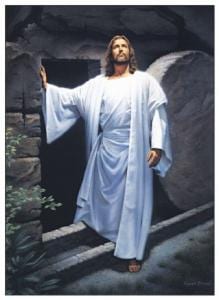 They both ran, but the other disciple ran faster than Peter
They both ran, but the other disciple ran faster than Peter
and arrived at the tomb first;
he bent down and saw the burial cloths there, but did not go in.
When Simon Peter arrived after him,
he went into the tomb and saw the burial cloths there,
and the cloth that had covered his head,
not with the burial cloths but rolled up in a separate place.
Then the other disciple also went in,
the one who had arrived at the tomb first,
and he saw and believed.
For they did not yet understand the Scripture
that he had to rise from the dead.
Easter Sunday The Resurrection of the Lord | USCCB
Pope Francis@Pontifex: This is the first #Easter message that I would offer you: it is always possible to begin anew, because there is a new life that God can awaken in us in spite of all our failures. From the rubble of our hearts, God can create a work of art.

There is a Franciscan tradition that the risen Christ appeared first of all to his
mother. It would’ve been a very private, intimate setting, not documented in the
Gospels. The Gospels do not record every incident in Jesus’s life. His encounter
with Mary is a tradition supported by the logic of love and devotion. Hence in
many Spanish-speaking countries, the Easter procession is called the Encuentro,
the meeting of Jesus and Mary.-Cardinal Seán P. O’Malley, OFM Cap Cardinal-Sean-Easter-2020-Homily.pdf (emfgp.org)
(Cardinal Sean also Wrote This on The Catholic Bard Cardinal-Sean-Easter-2020-Homily.pdf (emfgp.org))
Jimmy Akin@JimmyAkin3000: Yes. Catholics–like all historic Christians–believe in the resurrection of the body. The New Testament is rather insistent on it.
Jimmy Akin’s Mysterious Interview
The proclamation of the Lord´s Resurrection lightens up the dark regions of the world in which we live.
Pope Benedict XVI: The Resurrection of the Lord is Our Hope – Easter / Lent News – Easter / Lent – Catholic Online
Luke presents his gospel as an historical account, based on the testimony of eyewitnesses. Similarly, the Gospel of Matthew begins with a genealogy, and that signals to us that it is rooted in the historical record. The Gospels are written as eyewitness accounts. St. Paul in his first letter to the Corinthians tells us that Christianity itself depends upon the Resurrection. “If Christ has not been raised,” he says, “your faith is futile and you are still in your sins” (1 Corinthians 15:17). It matters; there is none of this doubt-is-a-good-thing business from Paul. Christianity, as an historical faith which arose at a particular historical time, depended on an historical event: the Resurrection. If the Resurrection is no more than a myth, then Christianity is no more than a myth.
Is doubting the Resurrection “good for Christians”? (scottericalt.com) Scott Eric Alt Gives A Defence
If Jesus did not really rise from the dead who started the Resurrection myth and why? What profit did the liars get out of their lie?
If the miracle of the Resurrection did not really happen, then an even more incredible miracle happened: twelve Jewish fishermen invented the world’s biggest lie for no reason at all and died for it with joy, as did millions of others.
This myth, this lie, this elaborate practical joke transformed lives, gave despairing souls a reason to live and selfish souls a reason to die, gave cynics joy and libertines conscience, put martyrs in the hymns and hymns in the martyrs — all for no reason. A fantastic con job, a myth, a joke.
A myth indeed. That idea is the myth. The miracle is the sober fact.- Peter Kreeft Proof of the Resurrection (catholiceducation.org)
It’s Funny How Catholics Do Comedy
Guards and women each reported the disappearance of the body.
There are stories of gods and demi-gods, dead men returning, living men bi-locating. But there is nothing even remotely like the Resurrection of Jesus. In the forty days, he came and went by some rhythm of his own. He passed through the stone that sealed his tomb-it was not to let him out that the angle rolled away the stone, but to let the women in. He passed through the closed door of the Upper Room, in which the Apostles were gathered. He rose into the sky at his Ascension. He was concerned to prove that he was not a ghost. Yet it puzzles us if we theorize too confidently about what a glorified body can or should do, just as the agony in Gethsemane puzzles whose who theorize too confidently on what the direct vision of God means to the soul of one still living here upon earth. Frank Sheed, To Know Christ Jesus

What happened on Easter Sunday was the most explosive experience in human history, shattering all previous expectations of human destiny. Before Easter, some of the philosophically inclined imagined an immortal human soul; certain Jews expected what they called the resurrection of the dead at the end of history. But no one expected this. For the Risen One was not a disembodied spirit (“…handle me and see, for a spirit has not flesh and bones as you see I have” (Luke 23:39), and the Risen One was alive in history, such that history continued in a transformed key.
The first witnesses to the Resurrection were all Jewish and the dramatic ways in which these early Christians changed bear eloquent witness to the explosive nature of their experience of the Risen One. George Weigel, The Easter explosion – Catholic World Report

Giraffes Are Like Werewolves@GiraffesAreFast·: @LT_TheBiblegeek you’re right that Easter doesn’t seem as big as Christmas or Halloween… but that’s also because of how commercialized those have become. � Not sure we want Christ’s Resurrection to go down quite the same path. �
Heather �@heatherinthePNW
11 yrs ago we asked our kid what he wanted for his bday and he asked for us to quit smoking. He was 9. We quit the next day w/the help of a lot of Easter candy, particularly Starburst jelly beans. Like an excessive amount. Every year we celebrate by eating a crap ton more of them. Also the best gift he could have given to us. ♥️
Emily ✨@alottaem: Why is Easter Egg Chocolate always so much nicer than normal chocolate?
Daniel P. Horan, OFM@DanHoranOFM: It’s really odd how those who believe they are “more Catholic than the Pope” do not recall that St Mary Magdalene has been portrayed holding an egg, symbolizing announcing the Resurrection, dating back to the most ancient iconography. To make fun of it is weird and ignorant. This theological symbol, in both the eastern and western churches, is precisely the reason that eggs are decorated at Easter.
Tweeting to the Choir: A Collection of Tweets

Tradition about the life of Mary Magdalene would seem to confirm that she was valued by the men who worked with her. She traveled with them, preaching the Gospel to no less than the emperor Tiberias, to whom she went carrying an egg as a symbol of resurrection. The emperor replied that a man could no more rise from the dead than the egg she was holding could turn red – and of course, the egg immediately turned red.
(This is quite possibly the origin of our custom of coloring Easter eggs, so maybe we should have our Easter baskets delivered by St. Mary, instead of by a giant terrifying bunny?).
Mary Magdalene – Preacher or Prostitute? | Rebecca Bratten Weiss (patheos.com) A Tribute to Rebecca Bratten Weiss

It’s hard to imagine the devastation Jesus’ disciples must have felt the day he was crucified. While we read the Gospels with post-Resurrection lenses, knowing what happens after Jesus’ death, they experienced it in the moment with the weight of finality. Not only had Jesus died, which would be enough to derail their belief in him as Son of God, but he was publicly executed by crucifixion. This was a form of torture and death that Roman officials used against many Jews and enslaved people, with the intent that it would further traumatize anyone else thinking about causing trouble for the empire. Jesus’ followers were understandably terrified in addition to mourning his death.
It is against this backdrop that Mary Magdalene’s faithfulness and key witness to Jesus’ death and resurrection stand out.-Mary Magdalene, the key witness – Where Peter Is

Mary Pezzulo@mary_pezzulo: You know how you can write a secret message in white wax on an Easter egg and it won’t show until you dip it in dye? I think saints are like dye. People seeking the Lord wholeheartedly will reveal what’s written in the hearts of the outwardly pious. The Catholic Bard’s Guide to Patheos Writers
Edith 에디스 �@CatolicaEdith:When I say it’s always Easter in my heart I mean it. The people who know me know it’s true. My non-religious coworker started buying Easter decor � I have let Easter invade my life to the extreme. My Lord is alive!!!! How could I not celebrate every day
Augustine of Hiphop @hiphopaugustine:
BOOYAH
alle-alleluia
no more bein blue y’all
this is more than hoopla
death’s sting is moot ha
tomb is a lacuna
hear the roar of Judah
alle-alleluia
Our society might consider Jesus some shadowy figure or ghost, but he is a person. Jesus looks at Thomas and invites him to take up his doubts. He responds exactly to what Thomas wanted. Jesus wants to respond specifically to our messy situations. When we have our doubts or troubles, Jesus wants to come there and heal us.. Even though I bet most of the others would have been just as incredulous as he was. In this story, Jesus comes to Thomas and enters into his messy life. We can often have an over-idealized vision of Jesus’ appearances after the resurrection. However, the reality is messier than most artwork. Jesus lives in our messy lives, not is some idealized state.
Jesus Comes Into Our Messy Lives (Divine Mercy Homily) | Matthew Schneider (patheos.com) The Catholic Thought of Fr. Matthew P. Schneider LC
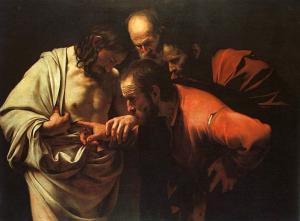
Jesus’ mission first had to survive betrayal, denial and abandonment by his own followers. After he washed their feet, including those of Judas, Jesus brought home the importance of this astonishing act. He was their master, yet he performed for them the basest task of the lowliest household slave. Lest they take this as only a gesture or symbol, he then said to them, “If you understand this, blessed are you if you do it.”
Liturgy challenges us to see beyond the rituals to the realities we are to put into action. The Mass and the Eucharist are incomplete if we do not take them into our lives and act on them. The breaking of the bread, like the washing of feet, is our celebration of the death of the Lord. He humbled himself, becoming a servant. He laid down his life for us.
The Easter season extends to Pentecost and invites us to ponder these mysteries in prayer and in the daily readings. But even more, we are being drawn into a life-changing conversion that leads to an encounter with the crucified and risen Christ. The Holy Spirit seeks a home in our minds and hearts. Blessed are we when that same Spirit reaches to our feet and sends us to share the Gospel in service.
Pat Marrin Beautiful feet | National Catholic Reporter (ncronline.org)

There is also the fact that—if used properly, alongside and subordinate to the actual mysteries of our Faith which inspired these observances in the first place—the secular observances designed for children can be quite useful. In this instance specifically, they can be taught that the egg represents Christ’s tomb, as the hatching of a chick can be seen to symbolize the resurrection—as do the flowers associated with the day, when they emerge from the sleep of winter. The Easter Bunny—as with Santa, the Tooth Fairy, and the crew of All Hallows’ Eve—can contribute at once to a child’s sense of wonder. The skillful parent shall superintend as the child grows a transfer of that wonder to the Church’s Sacraments and Sacramentals. It should be needless to say, but a sense of fun is as essential to surviving the slings and arrows of childhood, youth, and adulthood as a sense of humor is.

Unable to deal with the raw fact of Christ and His Church, the mind seeks refuge in metaphor, reducing the troubling supernatural visitant to the merely natural good. Yet it is precisely and only He Who was born of the Virgin Mary; Who suffered, died, was buried, and rose again; Who daily descends again to earth upon countless altars across the planet; and Who shall come again in glory to judge the living and the dead, Who can satisfy that yearning for endless love and for resurrection. Just as the child cannot understand the Mysteries of the Faith all at once but may become used to them with the aid of the secular aspects of these feasts rightly understood, so, too, with our countrymen—whom God has placed us among to evangelize.
Charles A. Coulombe Saving the Secular Easter (crisismagazine.com)

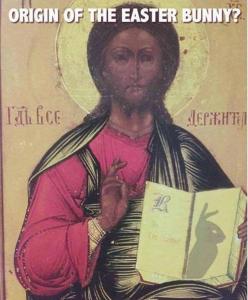


Unbeknownst to me, my body had spent more than forty days adjusting to my new lean and clean diet during Lent. My Lenten metabolism rebelled against the onslaught of sugar, flesh, and alcohol. The result: I was so sick on Easter. I spent the day feeling horrid. My Easter joy was robbed by gluttony.
I learned a solid lesson. A hard-core Lent that is full of penance is not necessarily a good Lent. Lent isn’t a survivor experiment. It’s a preparation for Easter. If you lose sight of Easter, your Lent is pointless. How My Strict Lent Once Ruined Easter – A Lesson on Lenten Crash and Burn – Taylor Marshall The Wisdom of Catholic Rigorous Vortex
Our Easter joy is not found in something meaningless such as “hope in hope” or “faith in faith.” It is grounded in the fact of Christ’s Resurrection. Indeed, that is the only fact that explains the advent of Christianity in an ancient world that didn’t build religions around platitudes. The only reason the disciples did not think their rabbi was just another failed messiah like all the others was because he proved he was not a failure to them three days after his crucifixion.-Trent Horn, The Emptiness of Liberal Theology | Catholic Answers
At death, the soul is separated from the body. Jesus, by dying and rising again, opened up the path to reunification. Just as his body and soul were joined once more when he was resurrected. His body was transfigured, glorified. And so too will all the bodies and souls of all the just be reunited when we are resurrected. The body that the soul rejoins will be your body—the same body reading these words right now—but it will also be different. We don’t know how. Scott Hahn, Easter and the Resurrection of the Body – St. Paul Center (stpaulcenter.com)
What is particularly fascinating about the accounts of Jesus’ resurrection is that none of these familiar frameworks of understanding is invoked. The first witnesses maintain that the same Jesus who had been brutally and unmistakably put to death and buried was, through the power of God, alive again. He was not vaguely “with God,” nor had his soul escaped from his body; nor had he risen in a purely symbolic or metaphorical sense. He, Jeshoua from Nazareth, the friend whom they knew, was alive again. What was expected for all the righteous dead at the end of time had happened, in time, to this one particular man, to this Jesus. It was the very novelty of the event that gave such energy and verve to the first Christian proclamation. On practically every page of the New Testament, we find a grab-you-by-the-lapels quality, for the early Christians were not trading in bland spiritual abstractions or moral bromides. They were trying to tell the whole world that something so new and astounding had happened that nothing would ever again be the same. What Easter Means – Word on Fire
I would like to offer the following for all those who were baptized or confirmed at the Easter Vigil (or just before):
“Therefore, Lord, we pray:
graciously accept this oblation of our service,
that of your whole family,
which we make to you
also for those to whom you have been pleased to give
the new birth of water and the Holy Spirit,
granting them forgiveness of all their sins;
order our days in your peace,
and command that we be delivered from eternal damnation
and counted among the flock of those you have chosen.”
(Eucharistic Prayer I, proper for the Easter octave.)
I will be praying that every day this week at Mass. Happy Easter! Fr. Louis Melahn
(Fr. Louis also wrote this on the Catholic Bard Reflections on Traditiones Custodes. )
Holly Rodriguez: Praise be Jesus Christ, may Our Lord bless you and keep you and make his face to shine upon you always. Prayers assured!
Have a Happy Easter, readers. And may God and Mary go with you! Happy Easter to All! | A Song of Joy by Caroline Furlong (wordpress.com)
(Caroline also wrote The Lion Guard VS DC Superheros on the Catholic Bard)


